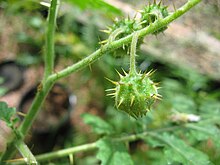Solanum sisymbriifolium
| Solanum sisymbriifolium | |
|---|---|

| |
| Scientific classification | |
| Kingdom: | Plantae |
| Clade: | Tracheophytes |
| Clade: | Angiosperms |
| Clade: | Eudicots |
| Clade: | Asterids |
| Order: | Solanales |
| Family: | Solanaceae |
| Genus: | Solanum |
| Species: | S. sisymbriifolium
|
| Binomial name | |
| Solanum sisymbriifolium | |
| Synonyms | |
|
Many, see text | |
Solanum sisymbriifolium is commonly known as vila-vila,[1] sticky nightshade,[2] red buffalo-bur,[3] the fire-and-ice plant, litchi tomato, or Morelle de Balbis.[4]
The small edible fruits are red[5] on the outside and yellow inside. It grows inside a spiny, green husk. The fruit is ripe when it is easily removed from the stem. The flavor resembles sour cherries and a little bit like a tomato.[4]
This plant has been used as a trap crop to protect potatoes from potato cyst nematode.[6] The stems and leaves contain solasodine which makes the plant very resistant to many pests and diseases, with the exception of potato beetles and tomato hornworms. It can also be used as a hedge plant to keep animals out of a garden, because it is covered with prickles (erroneously called thorns).[4]
Synonyms
[edit]


The sticky nightshade has been described under a number of illegitimate scientific names, many of them quite ambiguous homonyms:[7]
- Solanum balbisii Dunal
- Solanum bipinnatifidum Larrañaga
- Solanum brancaefolium Jacq.
- Solanum decurrens Balb.
- Solanum edule Vell.
- Solanum formosum Weinm.
- Solanum inflatum Hornem.
- Solanum mauritianum Willd. ex Roth (preoccupied)
- Solanum opuliflorum Port. ex Walp. (nomen nudum)
- Solanum opuliflorum Port. ex Dunal (nomen nudum)
- Solanum rogersii S.Moore
- Solanum sabeanum Buckley
- Solanum subviscidum Schrank
- Solanum thouinii C.C.Gmel.
- Solanum viscidum Schweigg.
- Solanum viscosum Lag.
- Solanum xanthacanthum Willd. ex Walp. (nomen nudum)
Several forms and varieties have been named,[7] but these are generally not considered distinct today:[citation needed]
- Solanum sisymbriifolium var. purpureiflorum Dunal
- Solanum sisymbriifolium forma albiflorum Kuntze
- Solanum sisymbriifolium var. bipinnatipartitum Dunal
- Solanum sisymbriifolium var. brevilobum Dunal
- Solanum sisymbriifolium var. gracile Mattos
- Solanum sisymbriifolium var. heracleifolium Sendtn.
- Solanum sisymbriifolium forma lilacinum Kuntze
- Solanum sisymbriifolium var. macrocarpum Kuntze
- Solanum sisymbriifolium var. oligospermum (Sendtn.) Dunal
Distribution
[edit]Native
[edit]South America
[edit]Introduced
[edit]Europe
[edit]- Austria,[8][9] Belgium,[8][9] Czech Republic,[8][9] Denmark,[8][9] Ireland,[8][9] Estonia,[8][9] Finland,[9] France,[8][9] Germany,[9] Hungary,[9] Latvia,[8][9] Lithuania,[8][9] Morocco,[8] Netherlands,[8][9] Norway,[8] Portugal,[8] Spain,[8][9] Sweden,[9] Ukraine,[8][9] United Kingdom[9]
- Italy[8][9]
Asia
[edit]Africa
[edit]North America
[edit]- Canada[9]
- Mexico[9]
- United States - ~64% of the country is suitable for S. sisymbriifolium.[5] Predicted to eventually be absent from most of Alaska, Montana, and Wisconsin, and to never enter North Dakota.[5]
- Alabama,[8][5] Arizona,[8][5] California,[8][5] Delaware,[8][5] Florida,[8][5] Georgia,[8][5] Iowa,[8][5] Louisiana,[8][5] Massachusetts,[8][5] Mississippi,[8][5] New Jersey,[8][5] New York,[8][5] North Carolina,[8][5] Oregon,[8][5] Pennsylvania,[8][5] South Carolina,[8][5] Texas[8][5]
- ABSENT from Idaho[5]
Oceania
[edit]Status as an invasive species
[edit]In South Africa it is listed as a Category 1b invader in the National Environmental Biodiversity Management Act. This means most activities with regards to the species are prohibited and it should be ensured that it does not spread beyond a landowner's domain.[10]
References
[edit]- ^ "Friends of Vila-vila" – via Facebook.
- ^ NRCS. "Solanum sisymbriifolium". PLANTS Database. United States Department of Agriculture (USDA). Retrieved 17 November 2015.
- ^ BSBI List 2007 (xls). Botanical Society of Britain and Ireland. Archived from the original (xls) on 2015-06-26. Retrieved 2014-10-17.
- ^ a b c Litchi Tomato article in Mother Earth News, December 2009
- ^ a b c d e f g h i j k l m n o p q r s t u "Weed Risk Assessment for Solanum sisymbriifolium Lam. (Solanaceae) – Sticky nightshade" (PDF). United States Department of Agriculture Animal and Plant Health Inspection Service. 2013-03-26. Archived from the original (PDF) on 2017-02-03.
- ^ Varandas, Raquel; Egas, Conceição; Conceição, Isabel Luci (2020-11-01). "Potato cyst nematodes: New solutions to an old problem". Crop Protection. 137: 105303. doi:10.1016/j.cropro.2020.105303. ISSN 0261-2194.
- ^ a b Solanum sisymbriifolium. Retrieved 2008-SEP-25
- ^ a b c d e f g h i j k l m n o p q r s t u v w x y z aa ab ac ad ae af ag ah ai aj ak al am an ao ap aq ar as at au av aw ax ay az ba bb "Solanum sisymbriifolium - EPPO Alert List". European and Mediterranean Plant Protection Organization. Archived from the original on 2020-11-30. Retrieved 2020-11-30.
- ^ a b c d e f g h i j k l m n o p q r s t u v w x y z aa ab ac ad ae af ag ah ai aj ak "Solanum sisymbriifolium". Centre for Agriculture and Bioscience International Invasive Species Compendium. 2019-11-22. Retrieved 2020-11-30.
- ^ "South African Government Gazette: Number 37320" (PDF). South Africa Government Gazette. 584: 28.
External links
[edit] Data related to Solanum sisymbriifolium at Wikispecies
Data related to Solanum sisymbriifolium at Wikispecies- "Solanum sisymbriifolium". Plants for a Future.
